- Our top platforms are Botpress, watsonx.ai, Kore.ai, Dialogflow, Amazon Lex, UChat, HubSpot, Liveperson, and Yellow.ai
- The biggest differences between these platforms are price, use case, and level of coding skill required
- Most platforms offer a free tier to test out their product
So, you're building an AI chatbot, eh?
Luckily for us (and a big shout out to LLMs), AI chatbots have become more sophisticated, more autonomous, and — most importantly for us — easier to build.
It's really not as hard as you might think to build a custom AI chatbot — you just need to fit the right chatbot platform.
Your choice of platform will depend on several factors (unfortunately, there's no one best chatbot platform for any and all needs). It will depend on:
- Your level of coding expertise
- What kind of integrations you'll need for your use case
- Your channel, i.e. whether you want to deploy a WhatsApp chatbot, Telegram chatbot, a website chatbot, etc.
- The complexity of your use case
Based on your needs and preferences, you might need to use an open-source chatbot platform, a white-label chatbot platform, a conversational AI platform, or a low-code platform.
So, honestly? The first step is figuring out what type of chatbot you want to build, and what kind of building resources you have.
Once you have a sense of what kind of projects you want to build, you can pick a platform that supports you.
The best chatbot will always be the one that works exactly how you want it to — so let's go figure out which platform will best suit your needs.
Most chatbot platforms here include a free plan and 1-2 paid plans. Some specialize in specific verticals, like customer support, while others provide any capabilities you might need to scale across business processes.
Ready? Let's get cracking!
1. Botpress
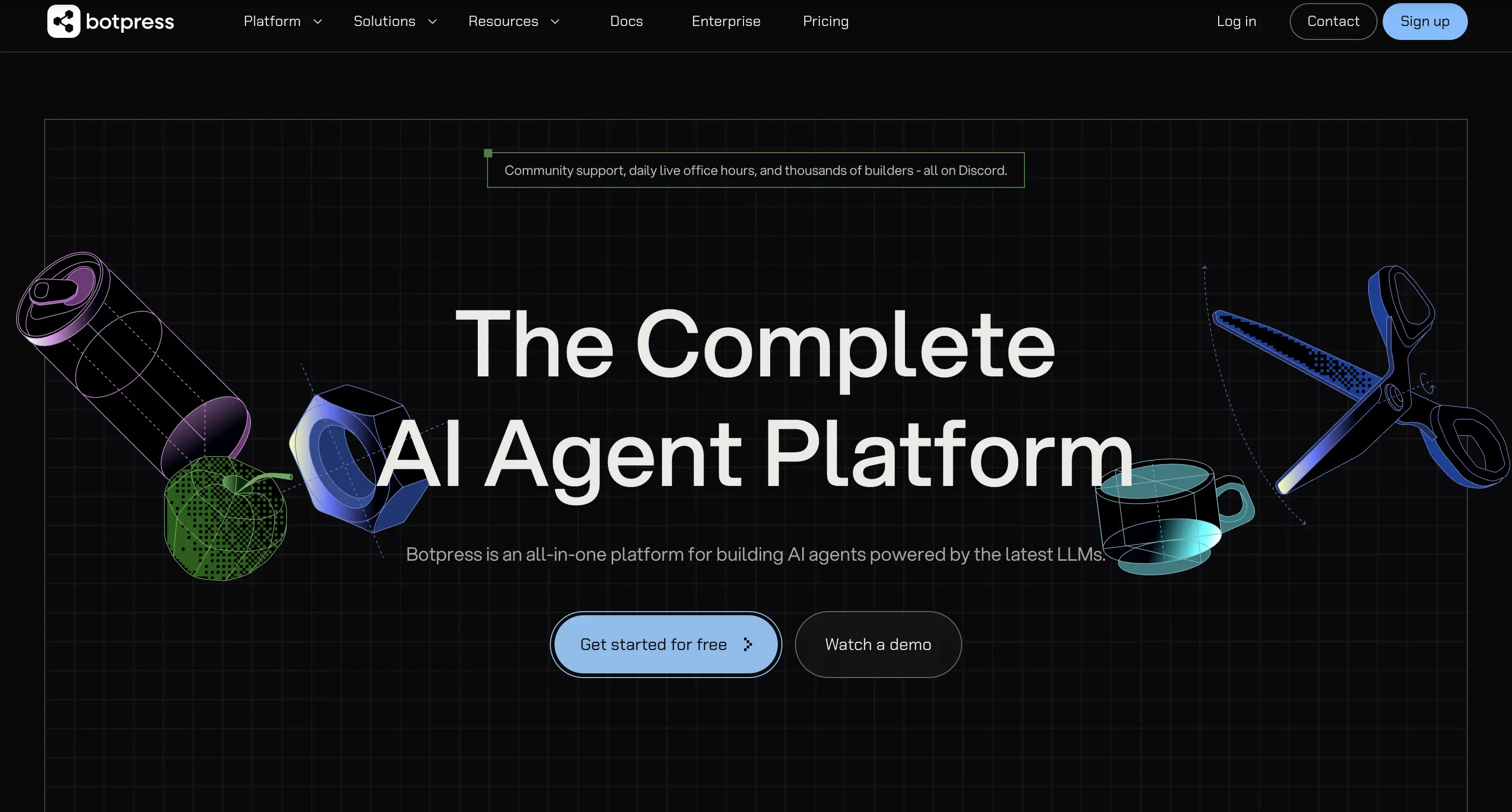
Botpress is a versatile AI chatbot platform, known for its advanced customizability and extensibility. It’s always up-to-date with the latest LLM engines, ensuring its chatbots and AI agents are always powered by the most recent technology.
It's great for developers and newcomers alike: it offers a visual drag-and-drop canvas in the Botpress Studio, automatic translations for over 100 languages, and endless customizability.
The platform includes pre-built integrations to the most popular software and channels, but allows developers to connect their bot to any knowledge base or internal platform. This endless extensibility makes Botpress an excellent platform for professional, enterprise-grade AI agents.
The company has over 750,000 active bots in production, processing over 1 billion messages. As a fully vertical solution, these AI chatbots span customer service, HR, IT, governments, tech, and more.
As a bonus, Botpress comes with a thriving community (honestly, less of a bonus and more of a necessity). There's an active Discord community of 30,000+ builders, daily AMAs with employees, and an extensive partner network of expert builders.
Learning the ins and outs of the platform is made simple with their YouTube video tutorials and by their expert-curated courses at Botpress Academy.
Key features

- Autonomous building blocks for low-code builds
- Advanced RAG system for accurate responses
- Over 100 pre-built integrations to channels like WhatsApp, Telegram, HubSpot, Notion, Calendly, Zendesk, Google Drive, and more
- Endlessly extensible and flexible
- User-friendly drag-and-drop interface
- Enterprise-grade security
- Advanced analytics
- Automatic translation to over 100+ languages
Pricing
Botpress offers a free plan, a Pay-As-You-Go Tier, a $89/month Plus Plan, a $495/month Team Plan, and an Enterprise Plan.
The free plan allows anyone to build a chatbot for free, and the Plus Plan allows for affordable deployment options.
Botpress is one of the few AI chatbot platform that offers zero mark-up on AI spend. That means when you pay to use an LLM's API, Botpress users are paying at cost, not an inflated rate.
2. watsonx.ai

You might know them from their decades of software and hardware work — that's IBM, which has (of course) set their stake in the AI chatbot game.
Their conversational AI platform is now called watsonx.ai (yes, the lowercase W is intentional, thank you). It's designed to build virtual assistants and voice assistants, specifically for customer service applications.
This platform leverages AI and LLMs to learn from customer interactions, aiming to improve issue resolution efficiency and reduce customer wait times.
Unlike traditional chatbots, watsonx.ai can query knowledge bases, seek clarifications, or escalate to a human agent as needed. So no frusterating back-and-forths with no resolution, like the customer support chatbots from 10 years ago.
What's more, this platform is adaptable for use in various environments, including cloud and on-premises setups (and that combo is hard to find these days!).
IBM also offers voice capabilities, allowing integration into telephonic customer support systems.
So what's it best for? As they like to say, it's a 'one-stop, integrated AI development studio for end-to-end AI application development'.
So, a bit of everything AI, but largely for enterprise clients.

Key features
- Agent assistance
- Artificial intelligence integration for better customer understanding
- A range of integrations with existing tools
- Enhanced security measures
- A visual builder for easy chatbot creation without extensive coding
Pricing
watsonx.ai offers different pricing based on needs. Their Foundation Models (for use of up to 300,000 tokens per month, or about 600 chatbot conversations) is free to try. Their cheapest paid plan starts at $1050 per month.
If your team requires Machine Learning Tools or Text Extraction, you pay on a per-usage model for each task. This pricing models makes watsonx.ai more appropriate for larger businesses than SMBs or individual builders.
3. Kore.ai
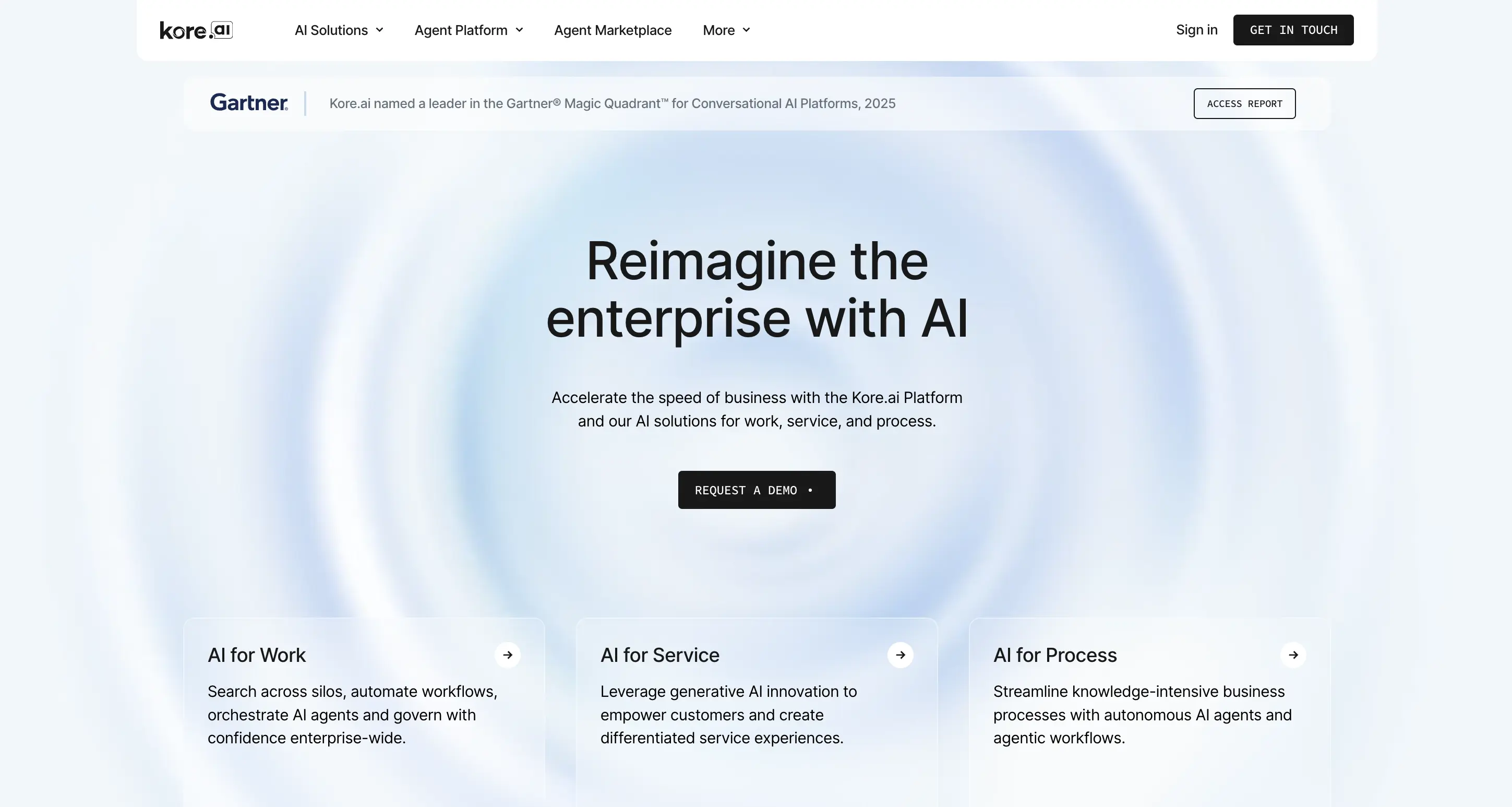
Next up? Kore.ai.
Kore.ai provides a multifaceted AI chatbot platform - that means it's designed for enterprises and small businesses. And its goal? 'Enhancing customer, employee, and agent experiences.'
This platform stands out for its ease of integration with the all-knowing Microsoft suite. Think powerPoint, Teams, Word, Excel, etc. So if you're looking to use Microsoft integrations, this might be the choice for you.
The Kore.ai platform also allows for a no-code approach, so their users can create virtual assistants without extensive coding skills. But if you're feeling advanced? It also doubles as a low code platform.
Kore.ai also focuses on security and compliance, crucial for sensitive sectors. No one wants a banking chatbot or healthcare bot that's gonna spill insider information.
And like any good platform, these guys are equipped with analytics and reporting tools. A side note: if you're deploying your chatbot to a high volume of users, you will absolutely be relying on your analytics. Don't forget.
This platform is less use-case-specific and more adaptable. You can use it across different industries, from IT to customer support. So if you need both, this might be the solution for you.
Key features

- Support for over 120 languages and channels
- Pre-built bots for various industries
- Advanced dialog management
Pricing
Kore.ai doesn't offer public pricing. You'll have to take a meeting with them to receive an exact quote.
That's because Kore.ai is aimed at enterprise companies, so it doesn't offer a self-service option.
However, word on the street (read: on public reviews) is that the typical Kore.ai deployments start at $300,000 annually.
4. Dialogflow
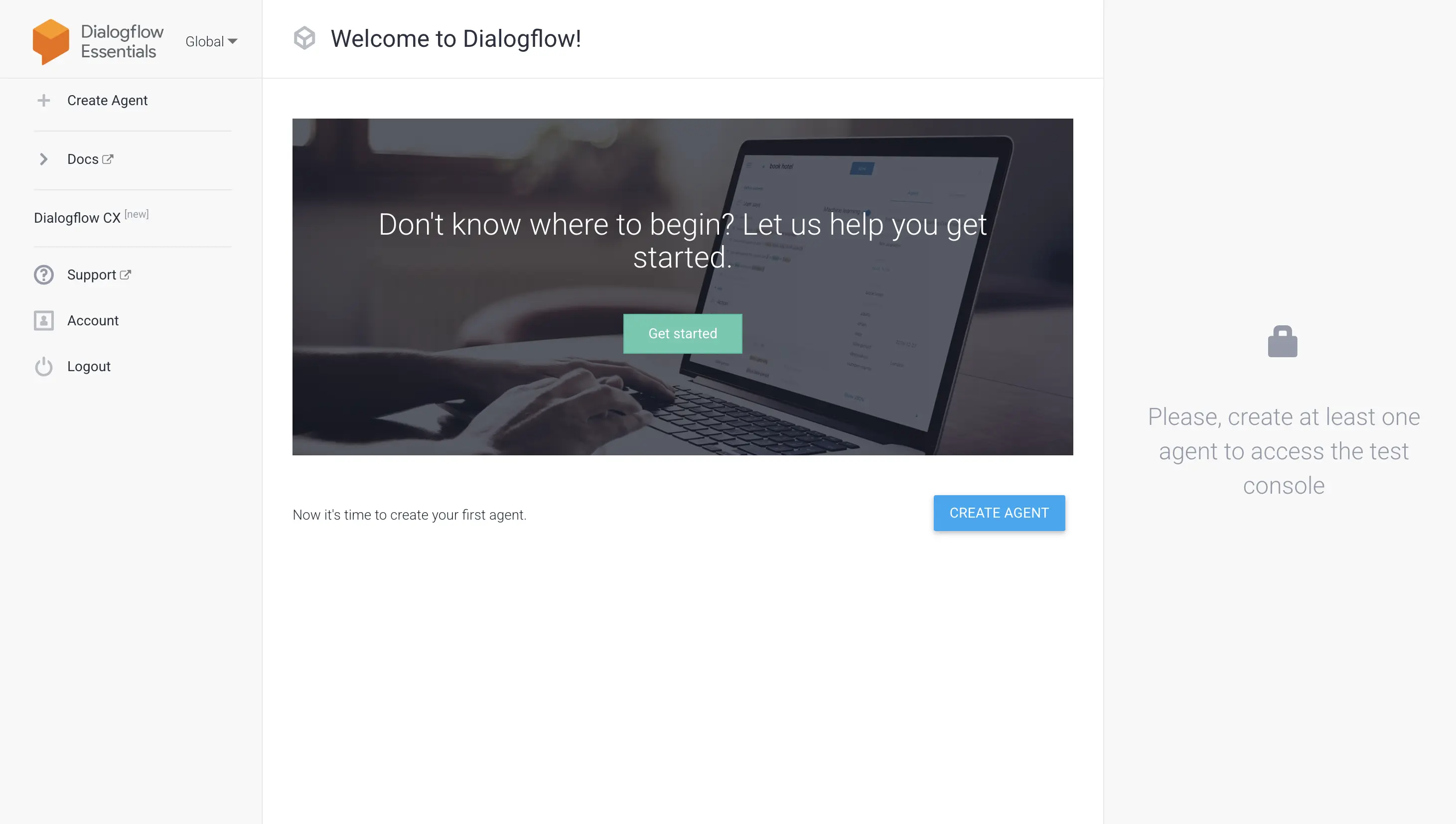
You know them, I know them. You probably got here by using their search engine.
Dialogflow is an AI chatbot platform developed by Google, offering two editions: Dialogflow CX (advanced) and Dialogflow ES (standard).
The Dialogflow chatbots offer 24/7 customer self-service through virtual agents and interactive voice response (IVR) systems.
They're capable of handling routine tasks and queries, while also providing seamless transition to human agents for complex issues. And let's be real, sometimes your users just have to speak to a human.
Dialogflow's versatility enables many conversational forms across various platforms, ensuring instant, accurate responses to common queries.
As for its choice of LLMs, Dialogflow is always built on Google AI. So if you want a platform that can accept different LLMs, you might want to look elsewhere.
Dialogflow also emphasizes ease of management and scalability, supporting a wide range of use cases like voicebots for customer engagement and chatbots for B2C interactions.
Key features

- Omnichannel implementation
- Multilingual support and 30+ language supported
- Visual flow builder
- State-based data models for managing conversation flows
Pricing
Dialogflow (both the CX and ES versions) follows a pay-per-usage model, like a few others on this list. For example, every request that calls for a text response with no generative AI costs $0.007 per request, while responses that use generative AI cost $0.012 per request.
There are some features that are gated to the higher-priced plans, like sentiment analysis.
This pricing model means the cost will increase depending on the usage volume of the AI solution.
5. Amazon Lex
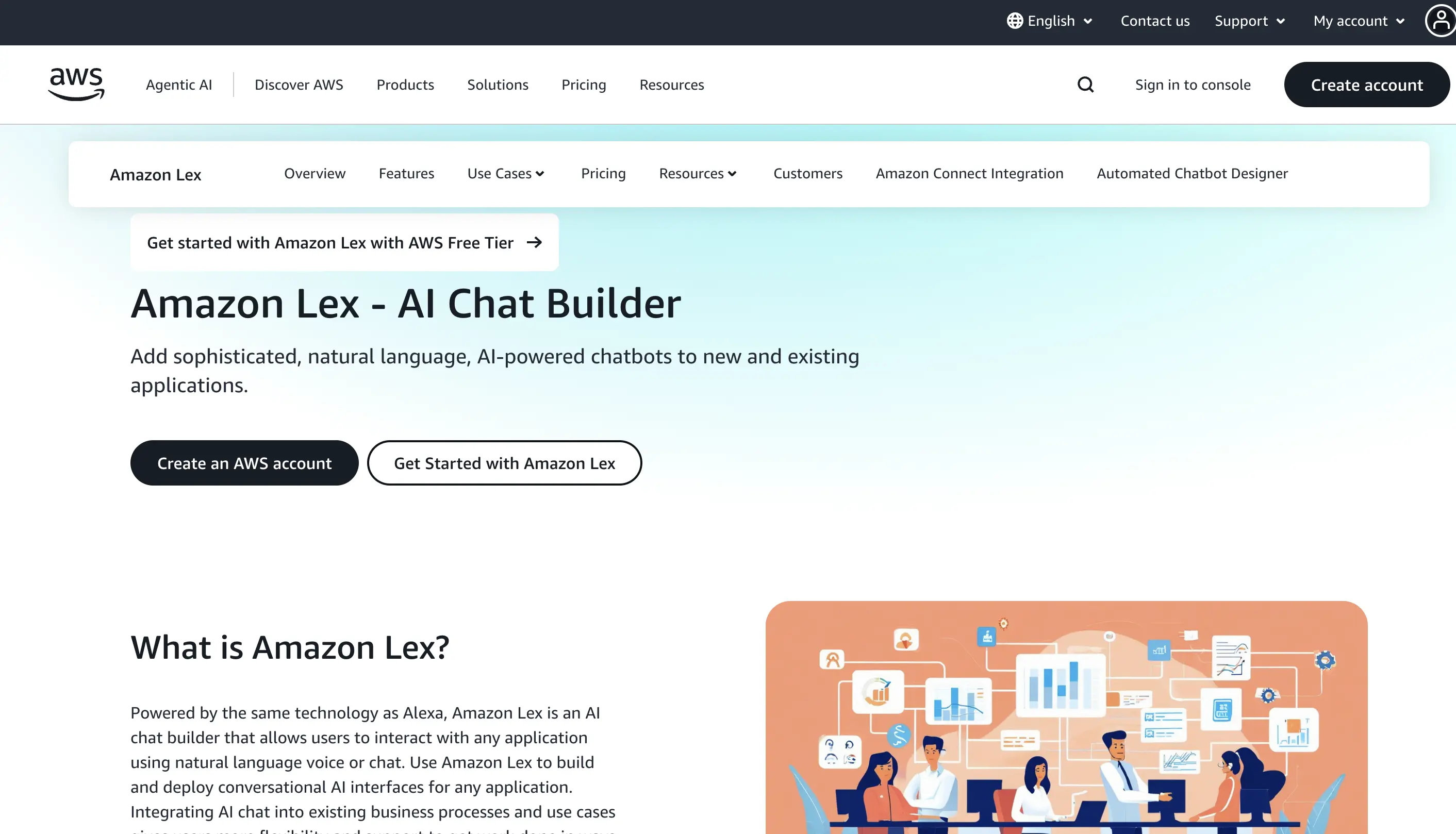
Another major player entering the AI chatbot field: Amazon Lex is a comprehensive service designed to build conversational interfaces.
Like many of the options on this list, Lex can be used to build both voice and text bots.
And just like Google, the whole 'ownership by a major corporation thing' means that this platform is powered by the their technology. in this case, it means the platform uses the same tech as Amazon’s Alexa. As another Amazon bonus, it specializes in easily integrating with AWS Lambda and other Amazon services (of course).
Amazon Lex chatbots will work with intents, utterances, and slots to provide request fulfillment for their users. As a fully managed service, it also eliminates the need for users to manage infrastructure.
With Amazon Lex V2, the service enhances its capabilities, offering even more intuitive and flexible conversational interfaces, integrating easily with AWS services and simplifying bot creation – without the need for deep learning expertise.
So if you want a lower-touch option and you're an avaid Amazon integration user, this might be the platform for you.

Key features
- Integration with other Amazon services
- Advanced voice features
- Drag-and-drop conversation builder
- Increased speech recognition accuracy
Pricing
Amazon Lex costs break down into two parts. Training is billed at $0.50 per minute, rounded up, so if analyzing your transcripts takes 15 minutes and 30 seconds, you’ll pay for 16 minutes, or $8.00.
Once your bot is live, streaming use is billed separately. Speech input, including silence, costs $0.0065 per 15-second interval, rounded up to the nearest block — for example, 52 seconds of speech would be charged as 60 seconds, or $0.026. Text input costs $0.002 per request.
At the end of the month, your bill adds up training costs and any streaming usage. So the price will depend on how many people use your bot and how much information it has.
6. UChat
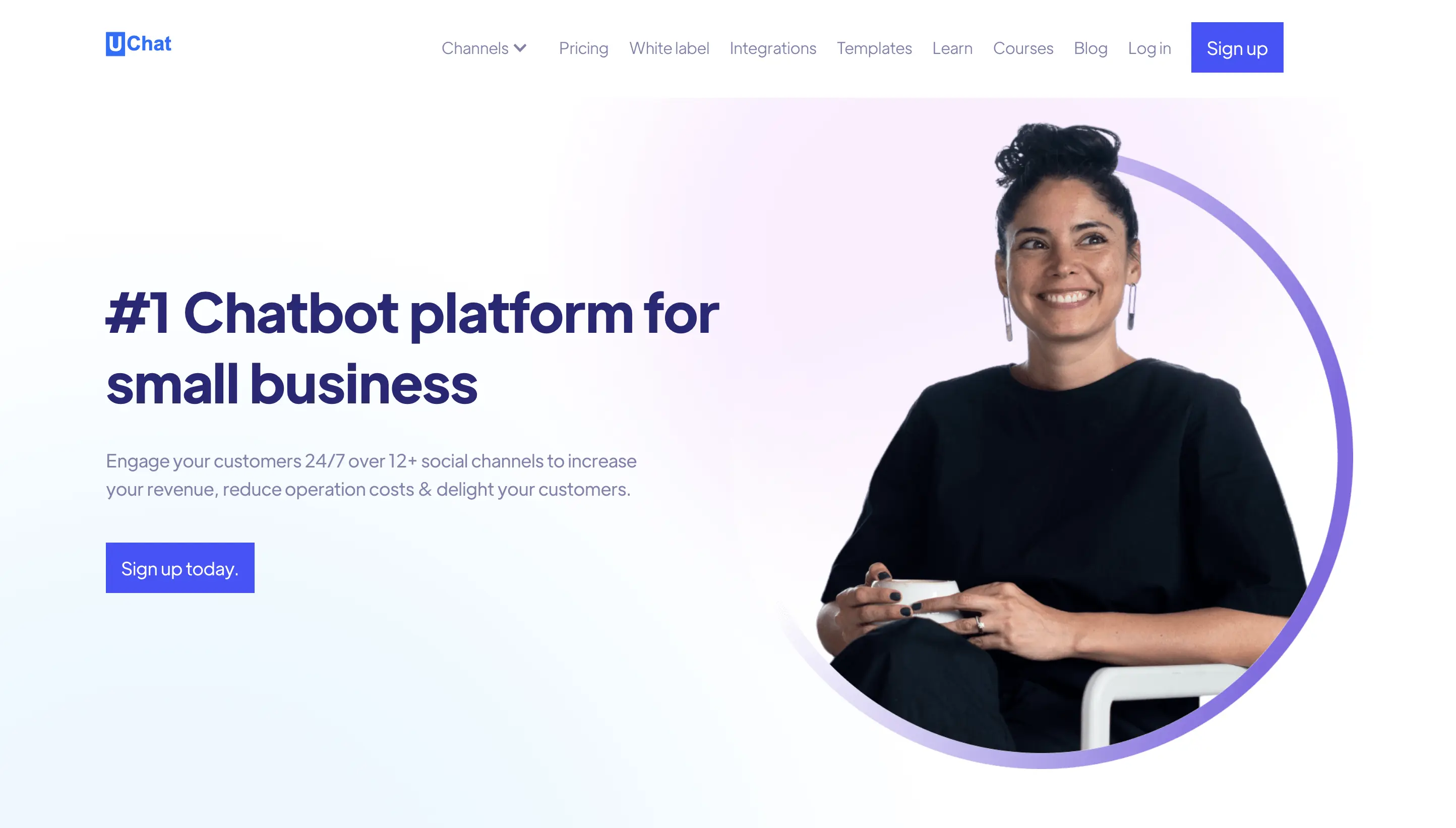
If you are not a coder, we have another option up your lane.
UChat is a comprehensive no-code chatbot platform. And what's more, they have a niche: small businesses and digital marketers.
This is another platform that uses specific LLMs (instead of BYOLLM, like some of the other options). Their chatbots are powered by OpenAI and Dialogflow.
It provides pre-built integrations across over 12 social channels, including Facebook Messenger, WhatsApp, and SMS. So if they have what you're lookin' for, then fantastic. Aside from the social channels, they have dozens of other integrations too.
Like other platforms, it features a user-friendly drag-and-drop interface, allowing for easy creation of advanced chatbots.
The platform stands out with its voice flow feature, enabling real-time voice virtual assistants and Interactive Voice Response systems.
The company’s bread-and-butter is omnichannel customer communication. What does that mean?
Glad you asked: Businesses can build a support bot to automate customer interactions, streamline sales processes, and provide conversational marketing solutions for customers of all kinds. You know, the typical chatbot stuff.
Its platform is able to white-label and personalize for different brands, making it especially appealing for chatbot builders at AI agencies.

Key features
- Built-in channel integrations
- A visual flow builder
- Option of white labeling
- Partner program
Pricing
UChat offers a free plan, a Business Plan at $15 USD/month, and a Partner Plan at $199 USD/month.
The Business plan offers 1 chatbot, while the Partner plan offers a customized number of bots. You can also purchase additional add-ons – an extra bot or an extra member is $5 for the Partner Plan and $10 for the Business Plan.
7. HubSpot
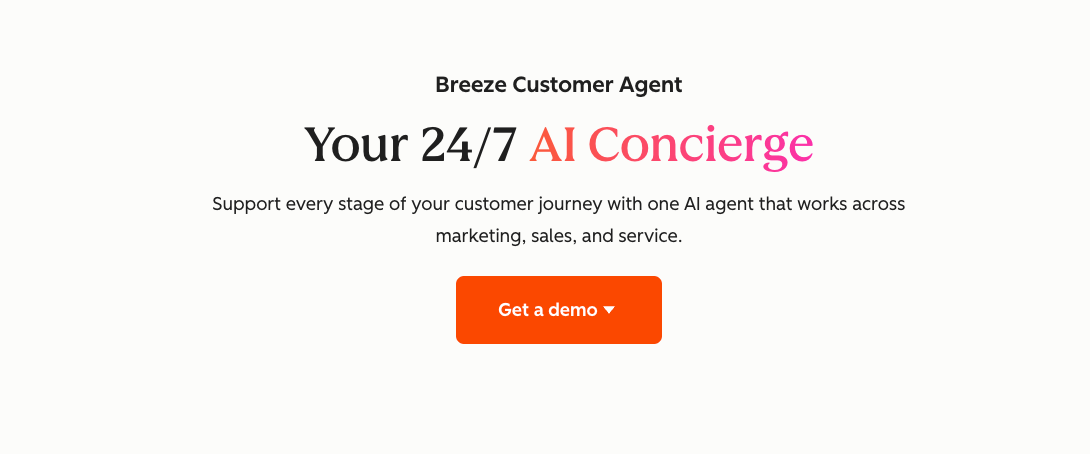
Thinking about adding some AI smarts to your customer support? HubSpot's AI Customer Service Agent fits right in, handling inquiries without the usual hassle.
It jumps into action on your site or in emails, answering questions based on your company's knowledge base. Say a customer asks about shipping times – the agent pulls the right info instantly, no waiting around.
This thing learns from past chats, getting better at spotting what folks really need. It can suggest fixes or even book meetings if things get tricky. And when it can't handle something, it smoothly hands off to a human rep, keeping everything flowing.
Integration is a breeze with HubSpot's CRM, it tracks every interaction, so your team sees the full picture. No more digging through logs; reports show what's working and where to tweak.
For small teams, it cuts down on repetitive tasks, freeing up time for the tough stuff. Bigger outfits get scalability, managing high volumes without dropping the ball. Pricing ties into HubSpot plans, starting free with basics, scaling up for advanced features. It's straightforward, pay for what you use, no surprises.
In practice, it means happier customers and less burnout for your crew. Worth checking if you're streamlining support.
Key features
- Handles customer questions using your knowledge base, giving quick answers without human help.
- Learns from chats to spot patterns and suggest fixes or hand off to reps.
- Tracks all interactions in CRM for easy reports and team follow-up.
Pricing
Breeze comes built into Professional and Enterprise plans, so you get it without extra setup if you're on those tiers. It uses HubSpot Credits to run – think of credits as fuel for AI tasks. Some plans throw in a batch each month, covering basic use. If you hit high volumes, buy more as you go. This keeps costs tied to actual chats, no fixed fees beyond your subscription. In practice, it means scaling support without surprise bills, just pay for what the agent handles.
8. LivePerson
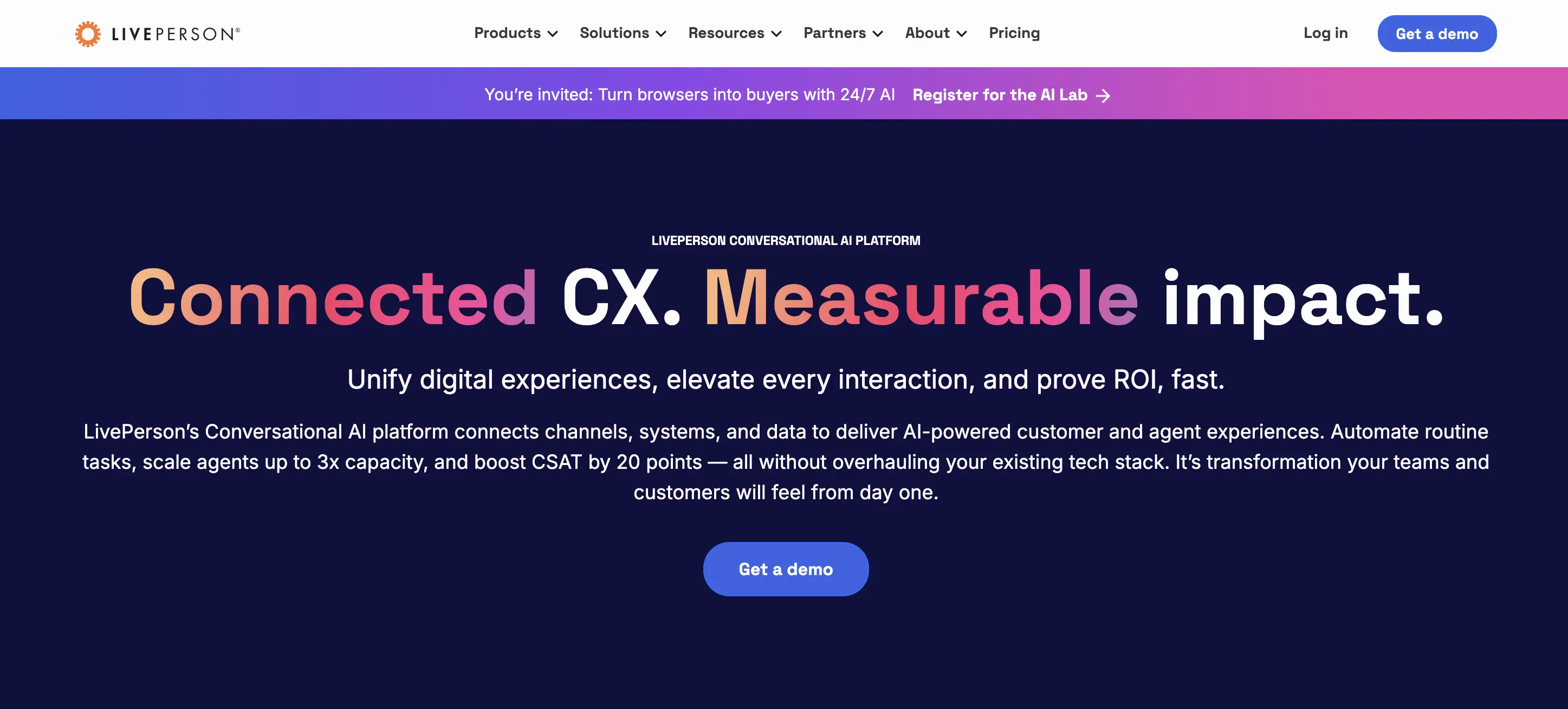
LivePerson was founded in 1995 and has expanded globally since. They provide voice and messaging capabilities in their chatbots, and allow users to integrate their bots with other communication channels.
Their chatbot app features human like conversations with advanced conversational AI, generative AI, and voice AI abilities, all hosted on their Conversational Cloud. Their product is adept at digitizing voice conversations for your website visitors.
LivePerson has third-party partnerships that support an omnichannel conversational suite, giving your bot the ability to connect to your data with Avaya, Amazon Connect, and Genesys.
Their generative AI allows for generative insights about customers, and their internal dataset powers their proprietary models.

Key features
- SSO sign-in
- Multi-language support
- Multi-channel deployment
- Built-in safety tools
Pricing
LivePerson offers 3 tiers: Bronze, Silver, and Gold.
Despite their pricing page heading that claims 'Simple pricing', exact pricing details are not available on their website.
For an estimate, reach out to them directly to book a meeting.
9. Yellow.ai

I have a compliment to share: I think it was very tasteful to name a company 'Yellow' but not make a yellow homepage. It would just be too much, don't you think?
Yellow.ai is an enterprise-grade AI chatbot platform designed to enhance both customer and employee conversational experiences.
It specializes in customer service functions, including retail chatbots, BFSI bots, and healthcare bots.
And they match you wherever you're at (or more accurately, wherever your customers are at). Yellow.ai allows for personalized interactions integrated across multiple channels, including websites, apps, and various messaging channels.
Yellow.ai hosts a no-code/low-code bot builder, enabling quick deployment of AI chatbots and agents without extensive coding knowledge. The deployment time is further improved with Yellow.ai’s prebuilt templates and integrations, so that builders aren't starting from nothing.
The platform can support conversations in over 100 languages, and they offer services like campaign management and autonomous customer interaction.
The platform features DynamicNLP™, (wow, fancy) which is used to facilitate high intent accuracy and multilingual fluency. This trademarked feature can significantly reduce deployment time and enhance scalability for chatbot builders.

Key features
- Pre-built integrations
- Chatbot templates
- Offers a unified customer service platform
- Chatbot insights for key metrics
Pricing
Yellow.ai offers a free plan and an Enterprise plan. The free plan allows only 1 bot, 2 channels, 1 custom API, and no custom dashboards.
However, their Enterprise Plan offers unlimited amounts of bots, channels, custom APIs and custom dashboards. However, pricing is only available via a meeting with their team.
Deploy a chatbot next month
Helping bot builders create best-in-class chatbots is what we do best.
Botpress offers a drag-and-drop visual flow builder, enterprise-grade security, an extensive educational library, and an active Discord community of 20,000+ bot builders.
Our extensible platform means you can build any custom chatbot with any custom integration — and our Integration Hub is full of pre-built connectors to the biggest channels.
Start building today. It’s free.
FAQs
1. What are the key criteria for evaluating chatbot platforms beyond features and pricing?
Beyond features and pricing, key criteria for evaluating chatbot platforms can include system reliability (uptime and latency), quality of onboarding and documentation, scalability under load, quality of developer and support communities, and ease of integration with your CRM, APIs, and messaging channels.
2. Are there any hidden costs for chatbot platforms?
Yes, many chatbot platforms neglect to include to cost of calling an LLM's API in cases of LLM-powered AI chatbots. Ensure you ask your provider if there are any extra costs if it's a concern before purchasing.
3. How easy is it to switch chatbot platforms after building a chatbot?
If you switch chatbot platforms, you'll have to rebuild your chatbot from scratch in the new software.
4. Can I use a template to help build my chatbot?
Yes, many chatbot platforms offer pre-built templates for popular use cases like customer service or lead generation. However, if you want a very customized chatbot, you'll need to put in some additional work to make your chatbot more impactful.
5. How do chatbot platforms ensure data privacy?
Chatbot platforms will be clear if they comply with security measures like SOC 2, HIPAA, and GDPR. If your chatbot will handle personal information, choose a chatbot platform with enterprise-grade security measures.





.webp)

